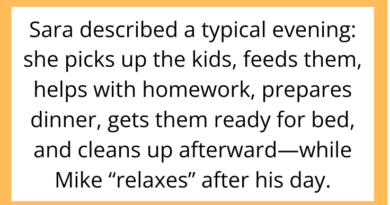AITAH for Refusing to Lend My Brother Money After He Blew His Inheritance?
When family asks for help, saying no can feel impossible. But what happens when you’re asked to clean up someone else’s mistakes—again? This AITAH story comes straight from a Reddit post that has everyone questioning where responsibility ends and enabling begins.
Let’s dive into the details.
The Backstory: A Brother’s Inheritance Gone Wrong

A 32-year-old woman—let’s call her Sara—shared her situation in the r/AITAH community. Her younger brother, Adam, recently burned through a sizable inheritance from their late grandparents. Instead of paying off debts or investing wisely, Adam spent the money on luxury vacations, a new car he couldn’t afford to maintain, and impulsive shopping.
Now, less than two years later, he’s broke—and knocking on Sara’s door for help.
He asked for a “loan” of $15,000 to cover overdue rent, bills, and credit card debt. According to Adam, this was the only way he could “get back on his feet.”
Sara Draws a Line

Sara earns a comfortable living and has some savings. But she’s also working hard to buy a home, and she has her own expenses to consider. She told Adam she wouldn’t lend him the money. She reminded him gently that he’d already received a substantial inheritance, and it was up to him to figure things out now.
Adam didn’t take it well.
He accused Sara of abandoning family, called her selfish and heartless, and complained to their parents. Their parents agreed she was being “cold” and urged her to reconsider.
Feeling guilty, Sara turned to Reddit to ask: AITAH for refusing to bail out my brother after he squandered his inheritance?
Understanding Both Sides

Why Sara Said No
Sara worked hard for her savings. She didn’t inherit wealth—she built her financial stability step by step. From her perspective, Adam was given a rare opportunity and chose to spend recklessly. Lending him money now felt like rewarding bad choices.
She also feared she’d never see the money again. Past behavior suggested Adam wouldn’t pay her back—and she wasn’t comfortable risking her future home purchase for his mistakes.
Why Adam Feels Betrayed
From Adam’s side, family means unconditional support. He saw the inheritance as his chance to enjoy life after years of struggle. Now, with bills piling up, he feels desperate—and abandoned.
He believes Sara can afford to help and should be willing to share her good fortune, especially since she’s in a stable position.
The Reddit Verdict

Reddit users overwhelmingly sided with Sara.
“Not your responsibility,” one commenter wrote. “He had his shot. Actions have consequences.”
Others pointed out that loans between family members almost always lead to resentment—especially when large sums are involved.
However, a few people encouraged compassion.
“If you can help in a limited way—like paying a bill directly—it might be worth considering,” another commenter suggested. “Just be clear it’s a one-time thing.”
The Bigger Lesson: Boundaries Aren’t Selfish

This story highlights a universal struggle: How much do we owe the people we love when their problems are self-inflicted?
It’s easy to feel guilty for setting boundaries. But as many Redditors pointed out, lending money doesn’t always help—it can create dependency and resentment.
Healthy boundaries mean acknowledging that you can care about someone without rescuing them from every consequence.
What Could Sara Do?

If She Wanted to Help
-
Offer to pay a single bill directly (not hand over cash).
-
Help Adam create a budget or connect with a financial counselor.
-
Make it clear this is a one-time gesture, not ongoing support.
If She Wants to Hold Firm
-
Explain calmly that she can’t risk her own financial goals.
-
Suggest resources: local aid programs, credit counseling.
-
Stand by her decision without guilt.
Final Thoughts: Saying No Doesn’t Make You a Villain

Families often pressure us to put others first. But as Sara’s story shows, protecting your own well-being doesn’t make you heartless—it makes you responsible.
At the end of the day, Adam’s financial problems are his to solve. While compassion is important, so is accountability.



